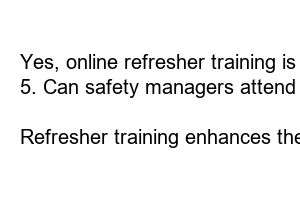안전관리자 보수교육
Title: Enhance Workplace Safety with Safety Manager Refresher Training
Subheadings:
1. Introduction: The Importance of Safety Manager Refresher Training
2. Key Benefits of Safety Manager Refresher Training
3. The Role of Safety Managers in Ensuring Workplace Safety
4. Updated Guidelines and Regulations: Staying Compliant
5. Tailored Training Programs: Enhancing Specific Skill Sets
6. Addressing Common Safety Manager Challenges
7. Frequently Asked Questions (FAQs) about Safety Manager Refresher Training
Introduction: The Importance of Safety Manager Refresher Training
Creating a safe and secure work environment is crucial for any organization. Safety manager refresher training plays a vital role in ensuring that safety managers are up-to-date with the latest guidelines, regulations, and skills required to maintain workplace safety. This training equips safety managers with the knowledge and tools they need to proactively prevent accidents, mitigate risks, and protect the well-being of employees.
Key Benefits of Safety Manager Refresher Training
1. Enhancing Risk Assessment and Incident Prevention: By refreshing their skills, safety managers can effectively identify potential hazards, assess risks, and implement preventive measures. This proactive approach helps in reducing workplace accidents and injuries.
2. Improved Knowledge of Updated Guidelines and Regulations: Safety regulations and guidelines are continuously evolving. Safety manager refresher training ensures that managers stay informed about any changes or updates in regulations, enabling them to maintain compliance and avoid penalties.
3. Strengthening Decision-Making Abilities: Refresher training helps safety managers in developing critical thinking and decision-making skills, enabling them to handle emergency situations efficiently, while keeping employee safety as the top priority.
4. Effective Implementation of Safety Policies: Safety manager refresher training aids in successfully implementing safety policies and procedures. Managers gain valuable insights on how to create a safety-centered culture, encourage employee participation, and establish effective communication channels within the organization.
The Role of Safety Managers in Ensuring Workplace Safety
Safety managers play a significant role in maintaining a secure work environment. They lead safety programs, conduct inspections, provide training, and ensure compliance with safety regulations. Their responsibilities include identifying and mitigating hazards, investigating incidents, and creating safety policies. Safety manager refresher training reinforces their role by sharpening their skills, expanding their knowledge base, and fostering continuous improvement in safety standards.
Updated Guidelines and Regulations: Staying Compliant
With safety regulations constantly being revised, safety managers must stay knowledgeable and well-informed to ensure compliance in the workplace. Refresher training equips them with the latest guidelines and regulations, keeping them ahead of the curve. Effective compliance reduces legal and financial risks, while also fostering a culture of safety.
Tailored Training Programs: Enhancing Specific Skill Sets
Safety manager refresher training offers specialized courses in areas such as risk assessment, emergency response, hazard communication, and safety program management. These programs cater to specific skill sets and provide managers with the tools they need to address the unique challenges faced by their organization.
Addressing Common Safety Manager Challenges
Safety managers often face challenges such as budget constraints, employee resistance, or managing safety across multiple locations. Refresher training addresses these challenges by providing practical strategies to overcome obstacles, streamline processes, and engage employees.
Summary:
Safety manager refresher training is crucial for cultivating a safety-oriented culture and complying with ever-changing regulations. It equips safety managers with updated knowledge, skills, and strategies to prevent incidents, safeguard employees, and reduce workplace risks. By undergoing periodic training, safety managers strengthen their ability to assess risks, make informed decisions, and successfully implement safety policies, benefiting both the organization and its workforce.
—
FAQs:
1. How often should safety managers undergo refresher training?
Safety managers should undergo refresher training at least once every two years to stay current with guidelines, regulations, and industry best practices.
2. Is safety manager refresher training mandatory?
While not mandated by law, safety manager refresher training is highly recommended to maintain a safe work environment, prevent accidents, and reduce liability risks.
3. Can safety managers customize their refresher training program?
Yes, many training providers offer customizable programs that cater to the specific needs and challenges faced by safety managers.
4. Can refresher training be conducted online?
Yes, online refresher training is available and provides a convenient and cost-effective option for safety managers who may have time or location constraints.
5. Can safety managers attend refresher training conducted by external organizations?
Yes, attending external training programs allows safety managers to gain new perspectives, insights, and networking opportunities.
6. What is the role of refresher training in career progression for safety managers?
Refresher training enhances the skill set and knowledge base of safety managers, increasing their value to organizations and improving their career prospects in the field of workplace safety.

